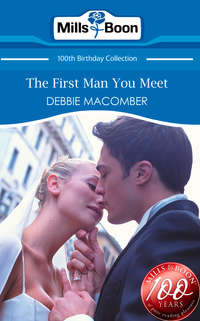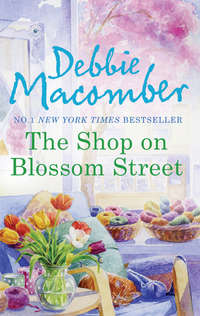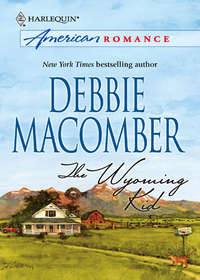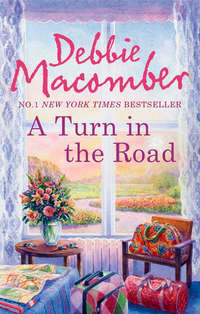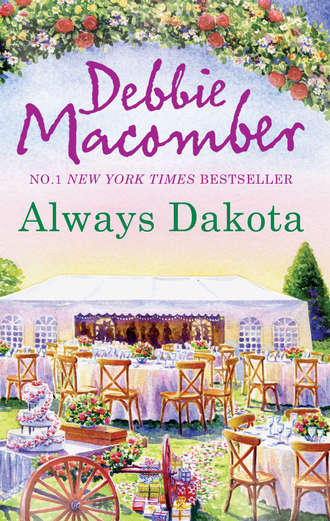
Полная версия
Always Dakota
Matt let the comment slide. He knew one thing for sure: if he did marry Margaret, the first thing he’d do was hire a different housekeeper. The thought pulled him up short. Sheryl was getting to him. He wasn’t going to marry Margaret, no matter how many arguments Sheryl advanced.
He remembered reading advice from Ann Landers years ago, in a newspaper he’d found in a doctor’s waiting room. She’d said something to the effect that the people who worked hardest for their money were those who married for it. Matt wasn’t in the habit of shying away from real work, and he didn’t intend to live off anyone else. When he was able to buy the Stockert ranch, it would be with money he’d earned himself.
“Margaret’s in the barn,” the housekeeper told him. Her gaze narrowed as if she were Bernard Clemens himself warning Matt to tread lightly around his daughter.
“How is she?”
Sadie paused. “She has good days and she has bad days.”
“She was close to her father, wasn’t she?”
The housekeeper nodded. “Mr. Clemens was a good man. Margaret is a good person, too.” With that, she slammed the door, leaving him to make his own way to the barn. Not that Matt needed anyone to draw him a map, but he would have appreciated at least the pretense of welcome.
He found Margaret inside the huge structure that put his own barn to shame. She was dressed in a heavy coat and thick boots; a knit cap covered her head. Her hair, which she’d grown over the past year, was pulled away from her face and tied at the base of her neck. He could see she’d had it curled. Working at a fast and furious pace, she pitched hay into an empty stall, her back toward him. Matt breathed in the satisfying scents of horses, straw and well-oiled leather.
“Margaret,” Matt called softly, not wanting to frighten her.
She whirled around and when she saw him, she stood transfixed, as if she’d been waiting for exactly this moment for a very long time. “Matt!”
“I wanted to stop by and tell you how sorry I am about your father.”
She stared at him with wide, adoring eyes, then raised her sleeve to her red nose, cheeks ruddy with exertion. So it was true, what Bernard had said—she was in love with him. But despite Sheryl’s urging, he refused to do anything about it. He wouldn’t lead Margaret to believe he reciprocated her feelings—or that they had any kind of future.
“I knew you’d come,” she whispered.
He looked away, embarrassed that it’d taken him three weeks to make an appearance. “I meant to get here before this.”
Her timid smile forgave him and he wanted to kick himself. Sheryl was right, even if her reasons were wrong; he should have come earlier.
“Your father was highly thought of around here.”
Margaret nodded, and he could see by the way her lip trembled that she was fighting back emotion. “I miss him something fierce.”
“I know you do.” Matt remembered when his own father died. He’d been fifteen, an age when it was difficult to express grief. He’d feared that if other kids saw him cry, they’d call him a sissy, so he’d lashed out at his mother. Why, he didn’t know. Probably because his parents had divorced and he’d blamed her, always blamed her. She never knew—or perhaps she did—that he’d been the person who’d slashed her tires. He’d done it in a fit of rage, and that had been the beginning of trouble for him. Before he was out of his teen years, he’d had more than one scrape with the law.
Now his mother, too, was dead, and he carried a double load of grief—and guilt. He didn’t think about his parents much, not anymore, but the memories never quite left him.
“Would you like to come inside?”
Her eyes were hopeful, and Matt didn’t have the heart to disappoint her.
“I’d offer you a beer, but Maddy told me—” She closed her mouth abruptly and blushed. “Sadie keeps a pot of coffee on all day.”
“Coffee would be fine. I can’t stay long.” Especially if Sadie was going to be giving him the evil eye. What had Maddy told her? he wondered next. That he drank too much? That he couldn’t be trusted? Obviously, his reputation had preceded him.
Margaret led the way into the house, stopping just inside the heated porch to remove her jacket and boots; he did the same. She opened the kitchen door and they were greeted by an array of warm, inviting smells. Matt glanced around, relieved that Sadie was nowhere in sight.
Matt noted the coveralls Margaret wore. They were shapeless and about the most unflattering piece of clothing she could have chosen. Yet when she stood on tiptoe to reach for a cup in the top cupboard, he was stunned to see that she had a halfway decent body.
Scolding himself, Matt forced his gaze elsewhere.
“Sadie bakes the most delicious cookies,” she told him as she opened the cookie jar and placed a dozen or so on a china plate. “I’d suggest we sit in the den, but neither of us is dressed for it.”
Margaret slowly approached the table, carrying a serving tray with two small china cups, sugar, cream and the plate of chocolate chip cookies.
“I’ll pour,” she announced grandly, as if this feat required unusual skill. She left and returned with the coffeepot and filled each floral-patterned cup to the brim, then smiled hesitantly, apparently awaiting his approval.
“Thank you,” he mumbled, uncertain what was expected of him. He felt nervous even touching the dainty porcelain cup, afraid he might snap off the delicate handle.
“This set belonged to my mother,” Margaret explained as she sat across the table from him.
“It’s very nice.”
“It’s all I have of her, except for the jewelry my father gave her, but I’ve never worn any of that.”
Rather than risk breaking the cup, Matt gingerly lifted it with both hands. There was a long silence. “I hope you’re adjusting,” he finally blurted out. “To your father’s death, I mean.”
Margaret didn’t reply right away, then said, “I’m trying.”
“Is there anything I can do?” His gaze held hers. He was surprised to realize what pretty eyes she had. Huge. A startling dark blue. Glossy black lashes. She stared at him, her expression completely rapt. Meeting her eyes for any length of time proved disconcerting and he promptly looked elsewhere. The girl had it bad, he thought with a sinking sensation. He wanted to warn her off, tell her she was making a mistake, but he couldn’t find the words. The women he dated knew the score, but Margaret was as innocent as a newborn calf. Naive, too, and completely inexperienced; that was obvious. What he needed to do was leave, and the sooner the better.
“I appreciate the offer, but there’s nothing anyone can do,” Margaret told him.
It took Matt a moment to realize she was answering his question. He nodded. “Well …”
“The ranch is going to be all right,” she went on.
Matt took a discreet sip of his coffee. “If you find you need anything, let me know.”
Now it was her turn to nod. “I will. Thank you for offering.”
“I’m sincere, Margaret,” he surprised himself by saying. “You’re a capable rancher and I don’t mean to imply otherwise, but there are times when neighbors need to rely on one another. I’m here for you, understand?” He told himself he would have said the same thing to any local rancher who’d suffered a loss or some sort of crisis.
“And I’m here for you,” she said in a low voice.
Matt downed the last of his coffee in one gulp, eager to be on his way. He’d stayed longer than he wanted, longer than required.
“You’re leaving?” she blurted.
“It’s time I headed out,” he said. Matt could tell she was disappointed, but she didn’t employ any clever means of detaining him. That was one of Sheryl’s tricks. He’d make noises about going home and she’d find some excuse to keep him with her. He had to give her credit; she was inventive—and often very sexy. Lately he’d been more conscious of her efforts and had become amused at the things she’d said and done to delay him. Sheryl could be one manipulative little devil.
“I’ll walk you to your truck,” Margaret told him, taking the coffee cups and tray to the kitchen counter.
He started to tell her that wasn’t necessary, then changed his mind. Being stared at by a woman’s adoring eyes was a flattering sensation, and Matt wasn’t beyond enjoying it.
Margaret quickly put her mud-caked boots back on her feet. She buttoned her coat all the way to her chin and stuck a knit cap on her head without any concern about what it did to her hair.
“I appreciate your stopping by,” she told him as they reached the truck.
“I’m sorry I didn’t come sooner.”
“I am, too.” She blushed then, as if she regretted having said this.
“If you’d like, I could stop by again.”
Her eyes flared with excitement. “I wish you would.”
Matt wasn’t sure what had prompted the offer. His ranch adjoined the Clemens property but this was only the second time he’d come to the house. Dropping by unannounced wasn’t a habit he planned to cultivate.
“Come any time,” she added, “any time at all.” She sounded so pleased and excited.
What happened then was something Matt would always wonder about. One moment he was preparing to climb into his truck and the next he’d wrapped his arms around Margaret Clemens the way he would Sheryl. He kissed her. He wasn’t sure why—curiosity, he supposed. He couldn’t keep himself from finding out what it would be like to kiss her. Since she hadn’t expected a kiss, it wasn’t fair to judge. But he did, mainly because he was kind of shocked. As kisses went, it was pretty good. No, damn good. Uncomplicated and—he hated to use this word—sweet. With other women, those with experience, a kiss was never simple. It involved tongues and teeth and it was often explosive with passion and need. A kiss hadn’t been innocent for him in a very long while.
He broke it off and released her. Margaret faltered and would have stumbled backward if he hadn’t caught her by the shoulders.
An apology would be appropriate, but he wasn’t sorry. If he was anything, it was confused.
“I’ll check up on you later in the week,” he managed to say.
She nodded and pressed the back of her hand to her lips. Her eyes were wide and jubilant, her lashes fluttering as if she didn’t know how to react.
Matt drove out of the yard and was halfway down the driveway when he glanced in his rearview mirror. Margaret stood there unmoving, her hand still against her lips, staring after him.
“That’s it,” Matt said aloud, shaken and bewildered by his own actions. “I’m not coming back. Not for anything.”
Calla Stern had expected her troubles to be over when she moved in with her father in Minneapolis. Her mother and Dennis Urlacher had publicly announced their engagement and hadn’t even bothered to let her know beforehand. Although she supposed if they had approached her, it would have been a wasted effort. She wanted nothing to do with Dennis, and no way did she want to be part of their perfect little family. Not in this lifetime!
Calla had always disliked Dennis. If it wasn’t for Dennis, she told herself, her parents might have reconciled when she was younger. She detested them both—Dennis and her mother—for the things they’d done, sneaking around, pretending no one knew they were having an affair. When Calla learned that her mother wasn’t even divorced at the time, she’d felt sickened by their disgusting behavior. Later, she’d been insulted and furious that they’d decided to get married and completely excluded her from their plans. Obviously they didn’t want her in their lives. Well, that was fine with her; Buffalo Valley was such a hick town and she’d wanted to get out of there, anyway. So it seemed fitting that she’d run away the night Dennis and her mother announced their engagement.
Living with her father, however, had turned out to be less than ideal. She’d been five when her parents separated, and her memories of Willie Stern had been hazy. Over the past eleven years he’d sent her the occasional postcard and intermittently kept in touch. Without realizing it, Calla had placed him on a pedestal—from which he’d quickly tumbled. Her view of Willie Stern had completely changed by the end of her first week with him.
Despite that, she still felt she’d had no choice. After her mother decided to marry Dennis, Calla had packed her bags, borrowed her grandfather’s truck and driven into Grand Forks, where she caught the bus to Minneapolis. It would be an understatement to say that Willie was surprised by her sudden appearance on his doorstep, but he’d let her move in with him.
For the first time in conscious memory, Calla had the opportunity to live in a real city with shopping malls, brand-name clothing stores and a school with more than twenty-five students. She didn’t need to order an outfit on the Internet or from a catalogue but could walk into a store and try it on in a real dressing room. She had the opportunity to meet lots of other kids her own age, not just a handful. It didn’t matter that her father had been such a bitter disappointment. Soon after her arrival she’d run away from Willie’s place, but when her mother and Dennis came to collect her, she’d chosen to go back with her father rather than return to Buffalo Valley. She could put up with Willie more easily than she could accept the idea of Dennis Urlacher as her stepfather.
“You get those floors mopped?” Jason Jefferies asked.
Jason was only a year older than she was, but he was the manager of the BurgerHaven where Calla worked part-time. “Didn’t you notice? I finished half an hour ago,” she said, unable to contain her sarcasm.
“Don’t give me attitude,” Jason snapped. “I got three friends who’d jump at the chance to work here. You give me a reason to fire you, Calla, and you’re outta here.”
“Yes, sir,” she said with a falsely sweet smile. Much as she hated to admit it, she needed this job. Her father’s income was erratic, its source questionable. And he sure didn’t share it with her. The reverse, in fact. Not waiting for a response, she turned and walked away.
Willie wasn’t the only disappointment Calla had to face. The high school back in Buffalo Valley had twenty-five students. Twenty-five. The one she attended in Minneapolis had over three thousand—more people than lived in her hometown and the surrounding county. Finding her way from classroom to classroom before the bell rang was a major challenge. She’d already gotten nine tardy slips. One more and she’d be ordered to afternoon detention.
One teacher, Mr. Simon, had been totally unreasonable. She had swimming in fifth period, and her sixth-period algebra class was on the third floor in the east wing. A sprinter couldn’t have covered that distance in five minutes! Mr. Simon docked her grade one full point every time she was late, and that was totally unfair. Her jaw tightened whenever she thought about it. The only classes in which she got decent grades were art and drama, because she’d volunteered to sew costumes for the senior production. They were doing The Importance of Being Earnest, and that meant lots of intricate Victorian dresses. Calla could lose herself in working with the patterns and fabric, in getting the details perfect.
Jason dimmed the lights and was ready to close the BurgerHaven.
Swallowing her pride, Calla approached him. “Any chance you could give me a ride home?”
He didn’t like doing it, she knew, but waiting for the bus by herself unnerved her. A couple of men had harassed her one night, and she’d had nightmares about it ever since. She hated to ask Jason for a ride, but she didn’t have any other means of getting home, besides the bus.
“You’ll have to pay.”
Calla nodded. What a jerk. He collected an hour’s wages for driving her one block out of his way. If he charged her any more, she might as well take a taxi.
Jason wasn’t the talkative sort and they rode in silence. Calla had hoped to make friends before now, but it hadn’t happened. School had been in session nearly three months, and she didn’t have one friend. Not even one. Trying to get to class on time was difficult enough.
Her father was sprawled in front of the television when she let herself into the apartment. She brought the mail and the free neighborhood newspaper in with her.
“You bring me anything?” he asked, not moving his gaze from the television screen.
“Not tonight.”
That got his attention. “They throw away all the stuff that doesn’t get sold, so why the hell not bring me a taco burger?”
Calla wondered if it ever occurred to him that they might not have leftovers. “There weren’t any,” she said, tired and out of sorts. It’s after ten, she wanted to scream. Leave me alone!
“Damn! I was all set for a taco burger, too. I don’t suppose you could get me dinner?” He looked beseechingly toward her.
Like she was a magician and could pull a decent meal out of a top hat. “Get you dinner?” she repeated. “With what?”
He leaned back and dug into his pants pocket and tossed her his car keys. “With these.”
Calla left the keys on the floor where they’d fallen. She set down her books and sorted through the mail, although it was mostly dunning letters from bill collectors and a few advertising circulars. She paused when she saw the envelope with her mother’s familiar writing. This wasn’t the first letter she’d received, and her reaction was always the same—hope and excitement. Even though she didn’t want to feel anything for her mother.
Sarah Stern had lied to her, and Calla refused to forgive her—for that and a truckload of other faults. The biggest of which was marrying Dennis Urlacher.
“You going or not?” her father demanded.
Calla barely heard him. A wave of homesickness threatened to drown her. She missed Buffalo Valley, missed her friends and her old job at The Pizza Parlor and even her old school. Her mother had ruined everything by marrying Dennis. Calla’s entire life had been stolen from her and it was their fault.
“What’s that?” Willie asked.
“A letter from Mom.”
“She send me any money?”
Calla rolled her eyes. Willie insisted that if Sarah wasn’t paying him the child support he thought he was entitled to, then Calla had to pay rent. Therefore, Calla paid rent.
“Well, aren’t you going to open it?”
“Yes,” she said, and headed toward her bedroom. When she did read the letter, she had no intention of doing it in front of him.
Sitting on the side of her bed, Calla stared at the envelope. It was thick, as if it included something extra. Her curiosity got the better of her and she tore it open. Inside were an airline ticket and a letter. She unfolded the letter.
Dear Calla,
I haven’t been able to reach you by phone to ask about your plans for Thanksgiving. I’m hoping you can arrange to make it home for a few days. It would mean a great deal to me. I miss you, Calla. I realize I haven’t been the world’s best mother, and I’ve made plenty of mistakes, but I do love you.
On the chance you can get away, I’ve enclosed an airline ticket. The flight leaves Minneapolis Wednesday afternoon and returns on Sunday morning. Dennis and I would pick you up at the airport in Grand Forks. If you’re uncomfortable staying with Dennis and me, then your grandfather wanted you to know you could have your old room at his house.
Everything’s going well here in Buffalo Valley. Dennis and I bought the old Habberstad house. The two of us rattle around in it, but we both enjoy decorating it. With five bedrooms you could have your pick if you decided you wanted to move back home.
You haven’t answered my letters or taken any of my calls. I know you’re angry with me, Calla, and I’m sorry. It’s time we settled all this. Don’t you think so, too?
Love,
Mom
“What did she have to say?” Willie asked, standing in her bedroom doorway.
“Nothing,” Calla muttered, stuffing the letter inside her backpack.
“What’s that?” he asked, pointing to the airline ticket she’d set beside her on the bed.
“A ticket.”
He laughed. “Home for Thanksgiving, right?”
Calla didn’t answer.
“Home sweet home with Mommy and her new husband. You’re not going, are you?”
“I haven’t decided.”
He glared at her. “I was hoping you and I could spend the day together.”
Calla recognized that for the bribe it was.
“It’ll be the first Thanksgiving we’ve had in eleven years. You aren’t walking out on me now, are you, kid?”
“I said I hadn’t made up my mind yet.”
He leaned against the doorjamb, arms crossed. “Did she tell you she’s pregnant?”
Calla’s gaze flew to her father. He was baiting her and she refused to bite. It would be just like Willie to make this up, but at the same time Calla knew that Dennis wanted a family. She supposed her mother could be pregnant. Still, she wasn’t sure she could trust Willie.
“She told me so herself,” he muttered.
“I don’t believe you.”
“Ask her, then. She was saving it as a big secret, but she spilled the beans last time she called.”
Calla frowned uncertainly. Her father had a habit of lying, of saying exactly what she wanted to hear. Or didn’t want to hear, depending on the reaction he was after.
“I’ll tell you what,” Willie said, sounding bored with the subject. “You do what you want for Thanksgiving. Stay or go, it’s up to you. But as for your mother having a baby, ask yourself what you think is true.” With that, he left.
Calla stared down at the airline ticket. Then, with a deep sigh, jumped to her feet and threw it onto the rickety dresser beside the bed.
Her mother had made her choice, and she’d picked Dennis Urlacher over her.
Three
Rachel Fischer sat in a corner of her restaurant kitchen, where she kept her computer and desk. Writing out a check for the final payment of her loan from the Buffalo County Bank, she signed her name with a flair—and a deep sense of satisfaction. She ripped the check from the book, then stared at it, absorbing the significance of the moment. From this point forward, she was out of debt and free to pursue a relationship with Heath Quantrill, the bank president.
With the last of her bills paid for the month, she put on her hat and coat and headed for the bank. She walked briskly, facing the wind. Normally, the cold cut straight through her, but not today. She hadn’t seen Heath in a few weeks and looked forward to personally handing him the check.
He served as the senior loan officer and manager and worked at the Buffalo Valley branch three days a week, spending the other two at the bank’s headquarters in Grand Forks.
Rachel and Heath had an on-again/off-again relationship that she’d wasted copious hours analyzing. But over the summer their romance had grown serious and they saw one another exclusively. Since Rachel was a widow, much of her time went into supporting herself and her son. Heath wanted her to go out with him more often, but that was impossible and often a source of conflict. He’d suggested that if she invested as much time in their relationship as she did in her business, she need never worry about working again. The memory of that conversation infuriated her whenever she thought about it.
This past year had been difficult for them. She’d expanded both the hours and the menu of her weekend pizza delivery service—to reasonably consistent success. After paying off her original loan—for the pizza oven—she’d borrowed from the bank again to purchase tables and chairs and had turned her restaurant into a sit-down place serving dinner five days a week.
Her parents owned the building, so her rent was low. They’d operated the Morningside Café for many years, until the diner simply couldn’t survive in such a difficult economic climate. It’d broken her mother’s heart to leave Buffalo Valley and she’d pleaded with Rachel to join them in Arizona.
A recent widow at the time, Rachel had debated long and hard about uprooting her young son, and eventually decided against it. Mark had endured enough upheaval in his life after the loss of his father. Besides, every book she’d read on widowhood suggested she delay making a major decision for at least twelve months.




